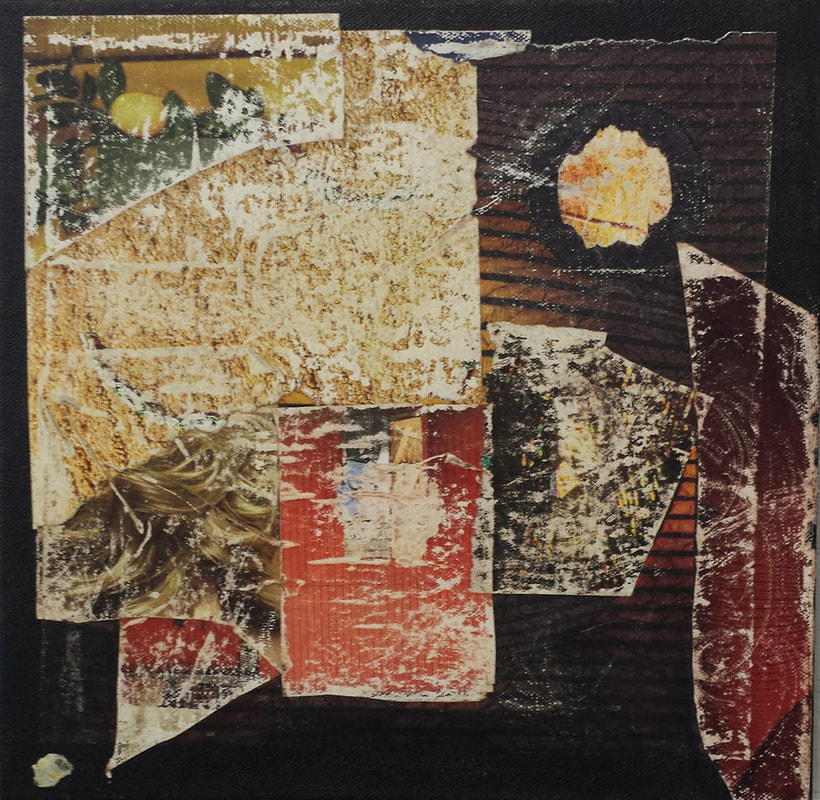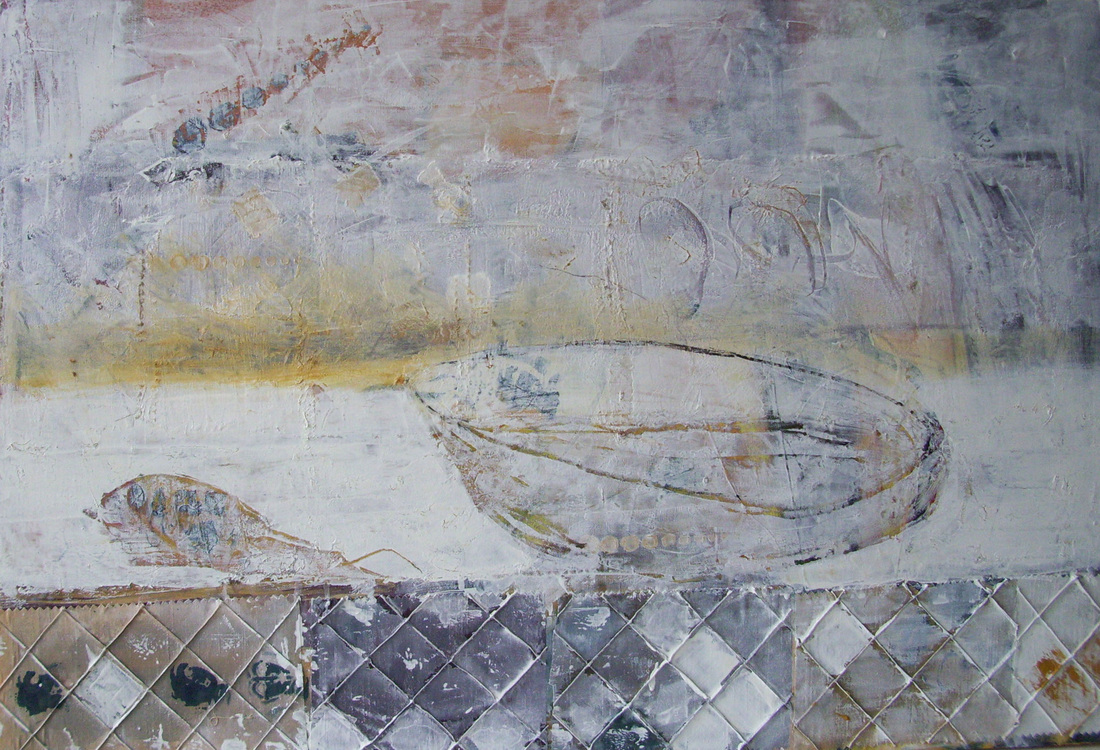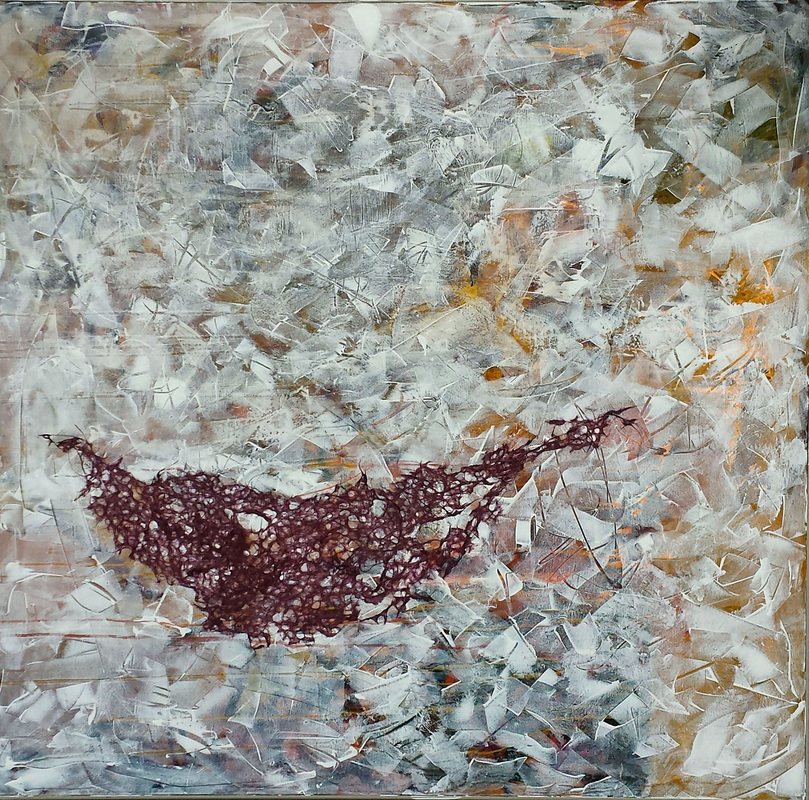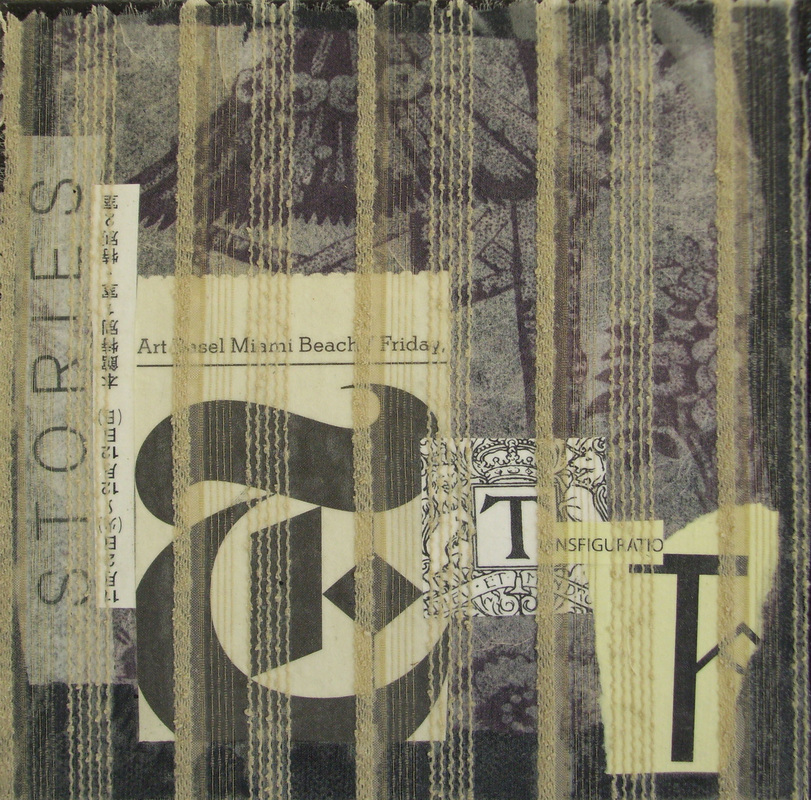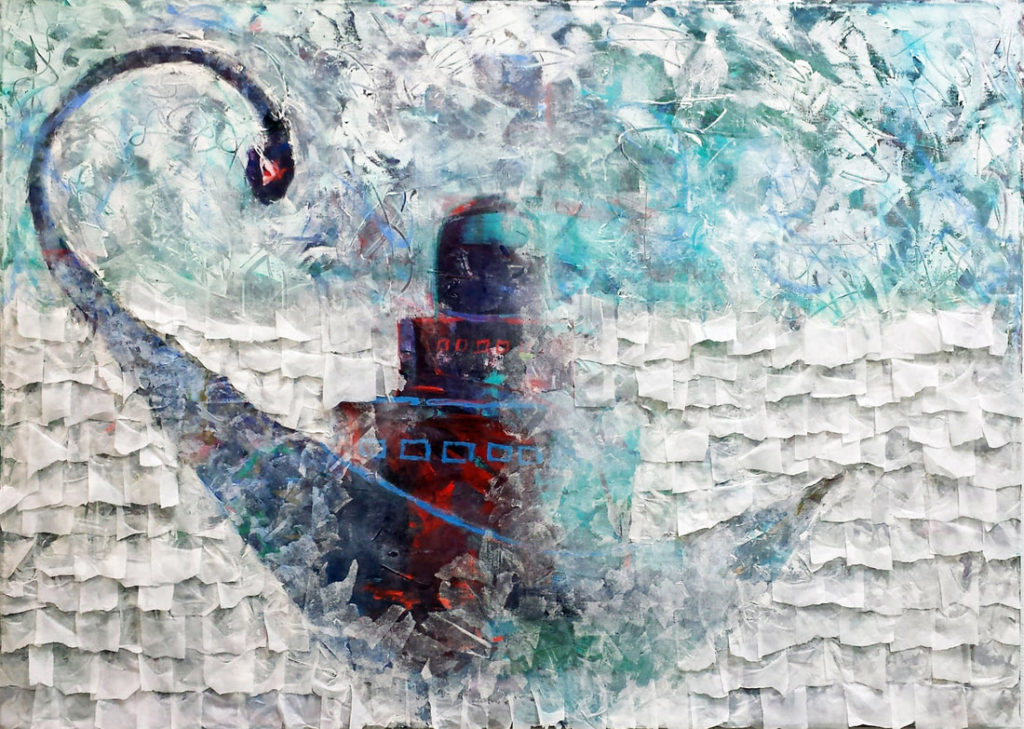
“Maneuvers,” by Kathy O’Meara.
[Part I of “One Tough German” can be read here.]
Eddie Jr. and his wife kept Virginia with them through the week, until the day of services. In that time, the space between death and the formal closure of grief, Annie saw her once, leaving the house to climb into the Lexus. Virginia’s hair was smartly styled, the beehive replaced by a svelte, attractive short cut which took off twenty years, Annie thought. She didn’t feel she could dart out and catch Virginia to whisper her condolences just then; there would be time enough after the services.
On Thursday morning, Annie dressed quickly for Eddie’s funeral. An old black dress with an even older tan jacket. She’d be no fashion plate, but respect for Virginia’s age made the choice of anything cooler, more summery, seem wrong. She found the modern, low-slung church easily, twenty minutes before the hour, and signed the book stationed on a small marble-topped table beneath a collage of photographs of Eddie and Virginia, their family through the years of little league, graduations, marriages, grandchildren. One picture drew her; she set down the pen and moved closer. A recent snapshot of Eddie and Virginia, seated on their living room couch. Eddie’s arm extended along the couch back, Virginia was perched on the edge of the seat as if she’d finally been coaxed to sit still by the photographer, or as if she were gathering herself to rise and fetch coffee and cake. Eddie’s hearty face was pure satisfaction: a king in his castle. Virginia’s expression was harder to interpret. It had the uncomposed look of a booking photo, the kind the paper ran once a week captioned by whatever crime had led its subject to such unflattering publicity, usually drink or drugs. Blinded by headlights? Caught with illegal possessions? Afraid of losing her soul?
Behind Annie, a stout woman in a flowered muumuu was breathing heavily, big draughty breaths punctuated by gasps, perhaps from the walk in from the street, perhaps chiding Annie for clutching the provided writing tool, holding up the line, thinking unkind thoughts.
“Excuse me.” Annie offered the pen. The woman cleared her throat, took the pen, and bent to sign her name in a long, loopy script which ran to the edge of page and curled upward. Her breathing frightened Annie. She remembered a relative’s story, one of Alan’s old aunts, who’d attended a funeral during which a sister to the deceased died herself, in the family pew before the services had even begun. One mourning turned into two. Annie backed from the table and bumped against someone’s heavy chest.
“Annie, right? To the south of Dad and Mom?” Eddie Jr. looked larger than life, shiny and black-suited, carapaced into the role of Hausauer patriarch.
“Yes. Annie.” Annie let his sweaty clasp take her hand. This time, it was she who withdrew her fingers first from his warm palm. “How is your mother doing? I—“
“She’s one tough German,” Eddie Jr. smiled. “She’s doing better than we’d expected.”
He must be on automatic, Annie thought, repeating those words again and again, a week of quick comforts dished out to near-strangers, people like her who were outside the circle of family. “I’m glad to hear that. I’m always home—“ But Eddie Jr. had turned away, murmuring first to the stout woman, then to a couple behind her.
Although the church was large, it was not crowded, so Annie found an aisle seat easily. She sat, then thought it more courteous to slide to the middle of the pew where latecomers would not need to squeeze past her. From her seat, she could see the family arranged in three rows of the slight transept. Virginia was there, centered between teenaged granddaughters. She was turned to one of them, a pretty girl whose blonde hair matched Virginia’s, smiling brightly. Annie had been mistaken in her choice of solemn colors: Virginia wore a blouse patterned in bold red and black branches—what seemed like sycamore leaves– black slacks, shiny red heels on her small feet. Annie realized she’d never in all her years in the neighborhood seen Virginia so femininely dressed, so apparently concerned with her own appearance, as she had in the past week. That Virginia’s loss had not extinguished, had encouraged, really, her attention to her own beauty made Annie glad so that, for a brief moment, she felt disloyal to Eddie. What if Eddie had been able to see his wife today as Annie saw her, as pretty as one of his perfect roses, fed and watered and tended so artfully?
Annie couldn’t remember the precise moment her concern with her hair, her clothes, had fallen away. It had happened, emphasized by the literal belt-tightening she’d practiced following the divorce (her leanness growing leaner, no need to decorate it with smaller sizes), and now she could count on one hand the pieces—a denim skirt, a navy-blue wool sweater–she’d bought in the last few years. Her hair she’d stopped fussing with—when exactly? Before Patti certainly, years in advance of Alan’s elopement with a clothes horse who wore spangled bracelets on her plump tan arms and silver sandals on her painted feet. Silver sandals. Annie took the hymnal from the wooden pocket in the pew back and fanned through the pages. She admired Virginia’s red heels as she’d not admired Patti’s sandals. She lifted a hand to her ponytail; she’d looped her shoulder-length hair into a barrette, like a schoolteacher or a flower child. What would it be like to cut her hair short, to mimic Virginia’s bob? She’d be bound to monthly visits to a hairdresser then, which is why she’d let her hair go long in the first place: the constancy of those appointments grinding into her calendar for years on end. Maybe Virginia welcomed these, was already filling her weeks and months with obligations, no longer to Eddie but to herself.
Alan had never seemed to notice. Whether she wore sweatshirts or silk blouses, her clothes hadn’t registered with Alan. Their first date, so far back, she’d borrowed a checkered dress from her college roommate because she’d thought it important to be new somehow, not herself, when she went out with this boy, a business major whose notorious kindness on their small campus now extended to her, including a spaghetti dinner and a mediocre movie. She’d not discerned, apparently, what had altered in Alan during the languid years of their marriage, what made silver sandals and golden retrievers, their newness and exotic difference from Annie, what Annie was still after twenty years, satisfy such unmet need. The revelation of Alan’s absorption by details she’d long thought he’d overlooked had taken her so completely by surprise that Patti had become the subject of their joint study, the final examination before graduation.
Was Virginia welcoming the newness of what she could become now without Eddie? Annie watched her, the organist’s somnolent notes mismatched to Virginia’s bright quickness, the graceful lift of her small white palm to her younger son’s face when he bent his head for a kiss before he sat in the family pew. As she half-listened to the pastor’s intonations, as she bent her head for a moment when commanded to pray, as she heard the testimonies of Eddie Jr. and two grandchildren, Annie thought not of Eddie’s passing but of Virginia’s becoming. Not of what would change in the neighborhood without Eddie, but what would change inside Virginia’s kitchen now there was no finicky eater to tempt and to coax. No shouted interrogations about where she’d put the push broom this time, about what had happened to the new clippers Eddie knew she’d misplaced. Nobody to call out: Meg, Meg, Meg.
The service took over an hour. Finally the procession of mourners trailed up the aisle and past the family. Annie took Virginia’s hand, then felt herself pulled close as Virginia stood.
“I’m sorry, Virginia.”
“Honey, Eddie loved you,” Virginia whispered, patting Annie’s back. “Thank you for coming.”
“Whatever I can do, you know I’m just next door.”
“I know, honey. I know.” Another hug, one last whisper. “Annie? You okay, honey?”
~
Virginia seemed to be okay, far as Annie could tell. There was a certain remoteness to being a neighbor, Annie realized, which Eddie’s presence had enforced. One could pull in the next-door garbage cans after pick-up, but children (Morgan, driving a miniature blue tricycle with a bell) couldn’t be allowed to wander onto another’s lawn. One could ask what a newcomer had paid for a house, but one didn’t ask if the newcomer had ever been married. (Eddie never had done.) One could leave a box of peaches fresh from a backyard tree, but one didn’t exchange birthday presents because birthdays were private affairs.
With Eddie’s passing, Virginia ignored the formalities. She picked up the morning paper at ten or eleven, still pajamaed. She was happy to make conversation at all hours, whatever her dress. She forgot to call the grandson to remind him to mow the lawn, which turned dry around the edges as summer’s last hard days turned harder. She let the Bermuda grass take over the rose beds. Virginia seemed to have lost track of garbage days, whether it was the week for the gray yard-and-garden or the green recycle bin. She had her hair styled anew every week. She wore blouses so garish, so improbably colored, even brighter than Eddie’s favorite rose, the orange and red Party Girl, standing now in a thatch of healthy weeds encouraged by the soaker hoses Virginia would set and then leave, daylight violations forgotten without a blink of remorse for the drought-stricken state. And instead of shifting, racehorse nervous, when she spoke to Annie across the lawns or through the carport, she stood planted on both feet, her tiny hands set firmly on her hips. I’ll never listen to that Rush Limbaugh again. I’ve had enough of him for a lifetime. The redneck idiot.
Annie, startled, made a point of remembering the neighborhood rules for Virginia. The week after Eddie was buried, she began pulling Virginia’s garbage cans out alongside hers. She put them back when she came home from work. She watched for Virginia’s running water, making it her mission to shut the valves before the tell-tale gutter flooding attracted the water police. On her midnight walks, Annie stooped to pull handfuls of crabgrass and spurge from beneath the roses. Digging her fingers into the earth, setting her heels and wresting the weeds from the earth felt good, the same kind of good Annie felt when she tiptoed through Virginia’s breezeway to drop the weeds into her neighbor’s garden bin. Helping her widowed friend to keep things up, she told herself. But when she thought carefully about it, she flushed. Even in the dark, even all alone on the curb, she felt as if somebody had overseen her tell, with confidence and aplomb, a deliberate, rather slanderous lie.
When they passed each other, Virginia pulling away in her car as Annie did the hand-watering or Annie pulling into her carport after work as Virginia stood on the curb kissing a grandkid goodbye, they didn’t speak of secret kindnesses. It appeared the family was keeping a close eye on Virginia, except that nobody save Annie seemed to understand that Eddie’s sphere was being eclipsed by inertia. Nobody else seemed to care.
~
Maybe seven or eight months after Eddie’s passing, when the local television station’s meteorologists had spent over a week whooping and hollering about the yearly rainfall totals breaking a twenty-year record, Annie stood in her carport and shed her black rain slicker after her midnight walk. More properly, it was a slicker of Alan’s, dating back to the years after college when winter backpacking didn’t seem so daunting, when sharing a sleeping bag made even the mountain weekends romantic. She shook the slicker hard, three times, and slung it carelessly on the driver’s side rear-view mirror of her car. There she’d remember to take it off before heading to work in the early morning, although the idea of losing the slicker didn’t, when she thought on it, seem such a bad idea. When she turned from the car to her kitchen door, she heard Virginia’s voice, uplifted and insistent against the drumming rain on the carport roof.
“Annie! Annie, honey!”
Annie’s pulse fluttered; was it Virginia, now, the way they said it often happened? Couldn’t live without the partner, the mate, the lost spouse?
“Annie!” Virginia was gliding across the lawn, barefoot, wearing only a magenta negligee.
“Virginia? What are you doing out—up so late—and in this weather–“
“It’s just water, honey. Come on over. I want you to have a piece of strawberry pie. I got the berries from the Fresh Picked Daily lot out on Thornton? It’s just done.”
Annie took Virginia’s hand. “Virginia, it’s after midnight—“
“We’re both up, aren’t we?”
Annie thought of sliding on the slicker, but the clamminess of old rubber—and the sight of Virginia’s own damp negligee, like a gown of glistening petals—made her step out across the lawn with Virginia’s hand in hers.
“I know you’re a night person,” Virginia said, cocking her head slyly when she turned toward Annie at her door. “I know you don’t sleep well.”
“You—I—“
“I’ve known for years. I don’t either. Sleep much.” In her kitchen, Virginia handed Annie a thick bath towel she pulled from one of three plastic laundry baskets filled with unfolded clothes and sheets, the product of a living household with more important tasks at stake than folding clothes. She lifted one from a chair and nodded to Annie: Sit there.
“Since Eddie?”
Annie couldn’t tell if it was pity or amazement animating Virginia’s face. “Oh no, honey,” she said, and Annie saw clearly the pity Virginia felt for her, for Annie. “Long before Eddie died. But now I don’t have to pretend.”
“Pretend?”
Virginia was cutting a slice of remarkable pie, so symmetrical in each of its whipped cream and strawberry layers that it might have been a studio prop. “Pretend to be asleep…you know, the way we do…so they don’t know what we’re thinking…the kinds of things we think that would make them upset or, you know…”
In the face of this bald confession, so unexpected and so frankly abrupt, all Annie could think to do was take a bite of Virginia’s pie. She didn’t know what manners were in order, what kind of female clucking might be demanded by Virginia’s offering. She didn’t know if she were capable, even if the script were made absolutely clear, of following Virginia’s line of conversation. So she took a second bite, and a third.
“You watch late night, ever?” Virginia asked, setting a glass of skim milk next to Annie’s plate.
Annie swallowed. “It’s on, usually, but I’m not watching, not exactly.” She took a long drink of milk. “For company, you know. To make the house…less empty?”
“Don’t I know,” said Virginia. “Another piece?”
Annie shook her head. “You do miss him, then?”
Virginia lifted the table knife she’d used to cut Annie’s pie. Like a geometry teacher or a deft surgeon, she cut the remaining pie into exactly equal pieces. If they were put on a scale, Annie was sure, they would weigh within grams of one another. Virginia was doing fine. Virginia was doing far better than Annie had ever done. Virginia was going to be all right.
“Honey.” Virginia paused to lift a jelly glass and sip what Annie realized must be wine. The glass was circled with pastel elephants; it had been—how old was Eddie Jr., Annie wondered—used in this very kitchen for nearly forty years, a relic from the child-bearing days when Virginia pretended…pretended what?
Virginia circled the lip of the glass with her finger. “The kids used to call him one tough German.”
She sat back solidly in her chair, a tiny queen on a restored throne.
“I see the chair’s empty in the living room. I see that, and I think: I can watch whatever I damn well want, whenever I damn well please. That’s missing, isn’t it?”
Anna Villegas worked as a full-time college English professor in California’s Central Valley for forty-one years. Her published work includes four decades of short stories, poems, essays, newspaper columns, and three novels. Now retired, she lives in Nevada City, California, where the folk, the foothills, and the ghosts of her Gold Rush forebearers supply inspiration for her fiction.




